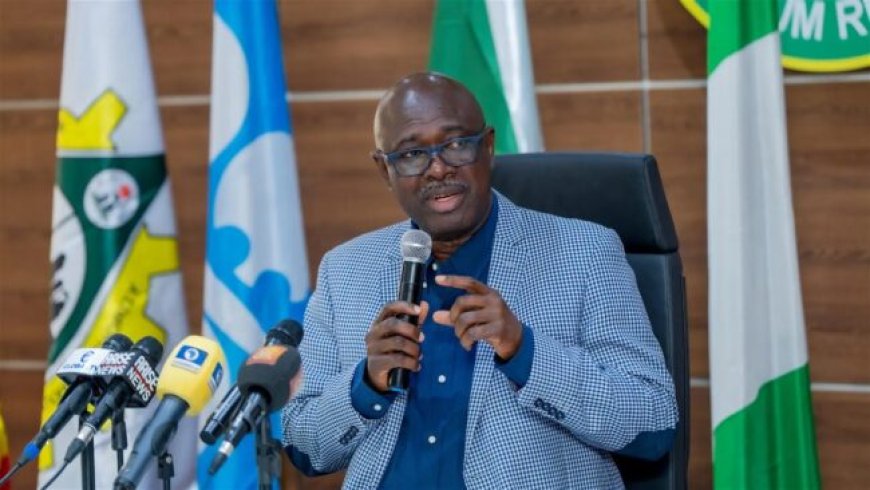FG deploying technology to reduce corruption in oil sector — Lokpobiri
FG deploying technology to reduce corruption in oil sector — Lokpobiri

Minister of State for Petroleum Resources (Oil), Heineken Lokpobiri, said the Federal Government is deploying technology to reduce the corruption that had drawn the sector backward.
Lokpobiri made the revelation while speaking as a panelist at the Heirs Energies Leadership Forum which was held at the Transcorp Hilton Hotel Abuja.
While expressing optimism that investment come to the industry in no distant time, unlike what was obtained in the past, the minister insisted that the Federal Government has set a target minimum of 2.5 million barrels per day (mpd) in 2025.
“We have approximately 1.8 million barrels (per day) in January. It is through that the budget of 2025 is predicated on 2.06 million barrels a day and I want to assure Nigerians that this is doable. I have always told people that when I came, one of the briefs I got was that during the Covid, we got 2.5 million barrels. The reason why we achieved what we achieved is because everything is in a changing era.
“You will recall that for about 12 years or over a decade, there was no investment but when we came, we have changed perception about Nigeria. Investments are coming in. We also improve the security situation in the Niger Delta. We want to use the opportunity to thank our military, paramilitary, and civilian contractors. The combined efforts of these stakeholders have led to fewer infractions of our pipelines, and less pipeline vandalisation and we are also able to increase production.
“President Bola Tinubu has provided strategic leadership for the oil and gas industry. Let me come to the issue of bureaucracy. Before now, you must know the minister or somebody who knows the minister before your documents are signed. Right now you don’t need to know me before your documents are signed. Once I get the recommendation from NUPRC, statutorily no documents stay on my table for more than 24 hours. I signed it, and then we movedd to the next level. And people who are here can bear witness to that.
“We’ve also addressed the issue of inefficiency. We are deploying technology today. You can recall that NUPRC, which is the regulatory body, has also deployed technology. We have been able to deploy technology to tackle issues affecting Upstream. Before now, everything was done manually; we couldn’t monitor in real-time what was happening in our terminus. The point is that technology has just been deployed to ensure that we reduce corruption that existed in that sector in the past,” Lokpobiri said.
Also at the event, the Commission Chief Executive (CCE) of the Nigerian Upstream Petroleum Regulatory Commission (NUPRC), Gbenga Komolafe, said the Commission has identified the oil wells to activate to achieve the 2.5million barrels per day (mb/d) target in 2025.
While saying that NUPRC would not resort to price fixing for crude oil, Komolafe, however, insisted on the commitment to comply with international best practices to allow the willing-seller, willing-buyer option.
He said, “For now, we are operating at about 1.75 million barrels. Going forward, the Commission has a line of sight on how to get to our target production of 2.5 million barrels per day. And in doing that, we have identified the key initiatives to actually achieve that target.
“We have identified the candidate wells that need to be reactivated, that need to be re-entered. And of course, we recognise that funding is key as part of the factors that needs to be put in place.”
According to the NUPRC boss, 38 oil wells have been opened with the hope of opening 50 wells between March and the end of 2025.
“Part of what we’ve done, equally, is to facilitate the situation we are in. The funders have been working. We have set up a platform there. All the key actors, the funders, and the rig owners interact with the larger initiatives.
“As of now, we have reached our target of 38 wells. And I want to say that, from the way we are driving the project, we believe that between now and the end of March, we should be achieving about 50 wells. Between now and the end of March, that is our intention.”
He added while the Commission is relying on its relationship with the host community to boost production, it is also not leaving any stone unturned to increase production from the oil-locked offshore areas, also revealing that the Commission is coming up with initiatives to encourage coastal infrastructure to boost crude oil production.
“As part of our processes, rather than just relying on people in the community, as part of the issue, the Commission is putting in place to ensure that the industry achieves the targeted product. Apart from that, the industry will need to witness that we are concerned that a lot of our capacity to increase our production is locked in offshore areas.
“And for that, we are coming up with an initiative whereby the Commission will encourage coastal development in a manner to address the infrastructural challenges. We are going to come up with an initiative in which development can be done in coasts that will leverage the economies of landscape; so all these activities that the Commission is backing up at least to ensure that we meet our targeted product,” he concluded.

 admin
admin 


